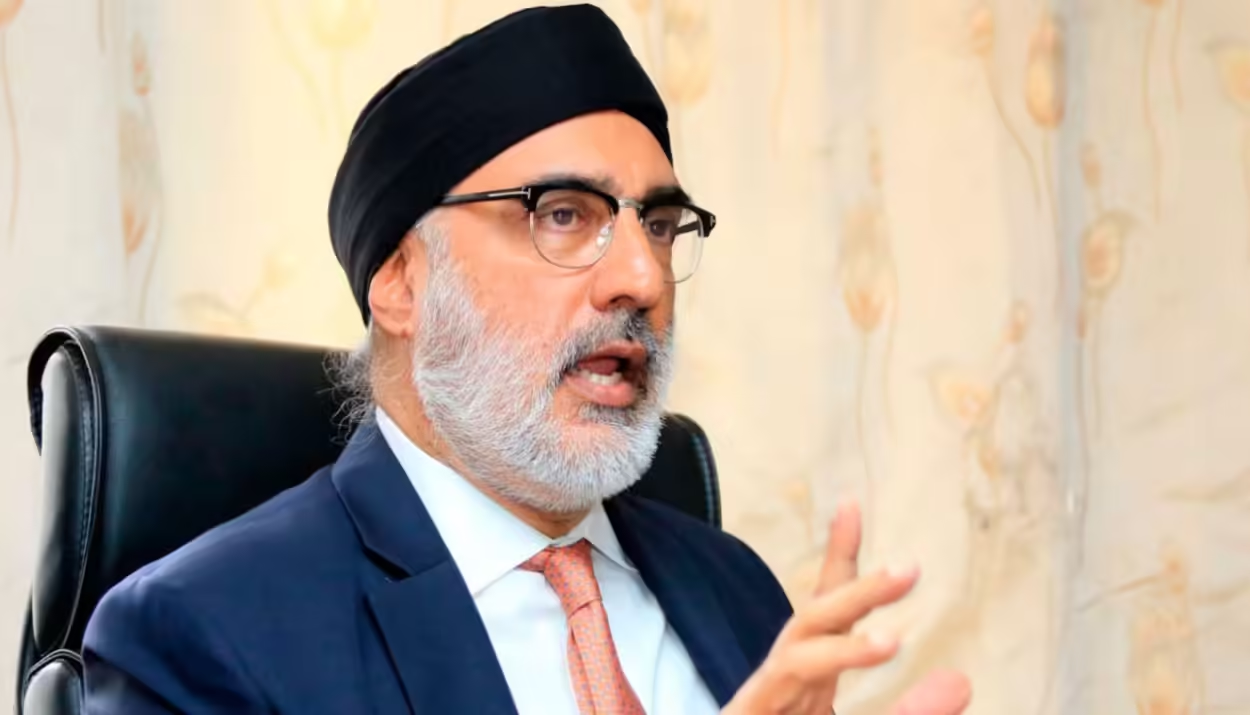Thrust into the spotlight after his abduction in broad daylight by armed men at the bustling intersection of Wood Avenue and Lenana Road in Nairobi’s Kilimani district in August 2023, billionaire businessman Jaswant Rai is no stranger to both power and controversy. As the chairman of Rai Group—a diversified conglomerate with interests in sugar, hospitality, real estate, edible oils, and soaps—Jaswant commands an empire that stretches across East Africa and beyond. But his journey to becoming one of Kenya’s most influential entrepreneurs began decades earlier, under the guidance of his father, the late tycoon Tarlochan Singh Rai.
Born in India, Jaswant moved to Kenya in the 1970s and embarked on his business career in the fruits and vegetables sector. Tarlochan, the Rai family patriarch, had made his mark in the Democratic Republic of Congo (then Zaire) by acquiring coffee and tea farms from Belgian settlers exiting the region. Jaswant joined his father in business from a young age, learning the nuances of deal-making that would later help him build his own empire. Today, Jaswant’s influence is especially prominent in Kenya’s sugar industry, where he controls some 43% of the country’s sugar production through West Kenya Sugar, Kabras Sugar, Olepito, and Sukari Industries.
Contents
Building the sugar empire
Jaswant founded West Kenya Sugar Company in 1989, which has grown into one of the largest sugar producers in Kenya, a market he has continuously expanded. By 2022, he opened Naitiri Sugar Company in Bungoma County, valued at KES 6.3 billion and capable of producing 6,000 tonnes of cane per day. This new venture further strengthened his grip on Kenya’s sugar industry, where the 2020 Sugar Directorate data revealed that Rai Group controlled 45% of Kenya’s sugar sales. The breakdown included West Kenya Sugar, with its flagship brand Kabras Sugar holding 29% of the market, Sukari Industries at 11%, and Olepito at 2%.
Jaswant’s sugar operations are among the most sophisticated in the region, with West Kenya Sugar leading in technology adoption and productivity. His plants are known for high efficiency, which has allowed him to keep production costs competitive. His dominance, however, has not come without scrutiny. He has been linked to a network of influential players accused of frustrating efforts to reform the sugar sector, though he has denied such allegations.
Expanding interests beyond sugar
The Rai family’s reach extends well beyond sugar, encompassing sectors such as cement (through Rai Cement), edible oils and soaps (Menengai Oil Refineries), timber (Timsales, RaiPly, and Webuye Pan Paper), wheat farming, horticulture (Menengai Orchards), and real estate (Tulip Properties). In recent years, the family has increasingly invested in real estate, establishing high-end properties that cater to Kenya’s growing urban elite. Through Tulip Properties, Jaswant has developed several landmark commercial and residential properties in Nairobi, as well as holdings in London and Uganda.
Jaswant’s influence extends across the business community, reinforced by his renowned sartorial style—he is known to wear custom-made suits by British designer Ozwald Boateng, the first and youngest Black tailor on London’s iconic Savile Row. His personal style is matched by his sharp business instincts, though he is no stranger to controversy, particularly over his family’s dominance in various sectors and allegations of state capture.
The family rift
The meteoric rise of the Rai family’s fortune also brought internal divisions, particularly among Jaswant and his siblings. Tarlochan Rai’s decision to place Jaswant at the heart of his estate did not sit well with other family members, who felt sidelined. This discord became evident following Tarlochan’s death in December 2010, leaving behind a contested will dated December 17, 1999, which named Jaswant as the sole executor.
Jaswant’s mother, Sarjij Kaur Rai, and his brothers Jasbir and Iqbal opposed the will, claiming that the patriarch may have been coerced into drafting a document that they argued inadequately distributed his assets among the eight beneficiaries. Sarjij, along with her sons, challenged Jaswant’s push for court approval to administer the sprawling estate, which has a presence in Kenya, East Africa, Malawi, India, and London. Sarjij passed away in January 2021, after beginning to give testimony in the High Court. Her challenge to the will alleged that key assets and funds—spanning Kenya, Uganda, India, and offshore locations—had been excluded from the estate’s inventory.
Jasbir and Iqbal contended that family companies, including Rai Holdings Limited in Kampala, which had acquired a significant stake in Uganda’s Kinyara Sugar Works in 2006, were omitted from the will, along with Rai Agro Industries in India and other offshore entities. Sarjij also claimed that the valuation of Rai Investments Limited, at 7% in the will, drastically underrepresented her husband’s declared share of 42.72%.
Mumias Sugar Company: Jaswant Rai vs Sarbjit Rai
The rivalry between Jaswant Rai and his younger brother Sarbjit Rai intensified in 2019 when KCB Bank placed the ailing Mumias Sugar Company under receivership to protect its assets. Sarbjit’s Uganda-based Sarrai Group won a 20-year lease to manage Mumias, a company that once controlled about 60% of Kenya’s sugar market. Jaswant filed a lawsuit challenging the award, arguing that his West Kenya Sugar Company had submitted the highest bid, at KES 36 billion, compared to Sarbjit’s KES 6 billion.
Jaswant contended that his company’s bid was improperly rejected on competition grounds, asserting that only the Competition Authority of Kenya (CAK) could make such determinations. His case argued that Sarrai Group lacked the technical experience and financial stability required to run Mumias effectively. The lease to Sarrai Group, Jaswant claimed, was motivated by factors other than shareholder and creditor interests.
The ensuing legal dispute brought the family’s internal conflict into the public eye, with both sides vying for dominance in Kenya’s lucrative sugar industry. Sarbjit’s Sarrai Group, which operates sugar companies in Uganda with a combined daily processing capacity of 19,000 tonnes of cane, defended its record, citing its successful operations across several estates in Uganda.
Ties with Kenya’s ruling elite
Jaswant Rai’s influence is often linked to his connections with Kenya’s political elite. His family’s relationship with various administrations—from the Moi and Kibaki regimes to former President Uhuru Kenyatta’s—has fueled speculation about state capture. Jaswant Rai has consistently denied any undue influence, yet his ability to secure favorable business terms and stave off competition has raised eyebrows. Comparisons have even been drawn between the Rai family’s influence in Kenya and the Gupta family’s notorious control over state functions in South Africa.
In 2014, the government appointed two receiver managers, Ian Small and Kieran Day, to find a buyer for the struggling Pan African Paper Mills in Webuye. The receivers ultimately resigned, citing pressure from government officials who appeared to favor T.S. Rai Limited, associated with Jaswant Rai. Though T.S. Rai Limited initially placed a low bid, the company later won the contract after a series of bids and negotiations.
Notably, during a 2017 wedding event for his son Tajveer and the daughter of another prominent figure in the sugar industry, Ragbirr Singh (known as Birre), the guest list was a display of Jaswant’s political network. President William Ruto, then serving as Deputy President, along with his family and then-Majority Leader Aden Duale, attended the event, while former President Uhuru Kenyatta’s brother, Muhoho Kenyatta, is known to be a close friend.
A legacy of power and controversy
Today, Jaswant Rai remains at the helm of a family business empire that has had a profound impact on Kenya’s economy. His ambitious approach to business, combined with his deft maneuvering in both the political and commercial arenas, has cemented his position as one of Kenya’s most powerful businessmen. Despite his wealth and influence, the controversies surrounding him—from his complex family feuds to his contentious dealings in the sugar industry—continue to shape his legacy.
As the family’s third generation steps forward, questions remain over how the Rai legacy will evolve in an increasingly competitive landscape. With his sights set on consolidating his businesses and expanding further across East Africa, Jaswant Singh Rai’s story encapsulates the complex interplay between family, business, and politics in Kenya.






